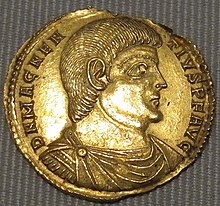Magnentius
| Flavius Magnus Magnentius | |
|---|---|
| Usurper of the Roman Empire | |

Golden multiplus by Magnentius
|
|
| Reign | January 18, 350 – August 11, 353 |
| Predecessor | Constans |
| Successor | Constantius II |
| Born | 303 Samarobriva, Gaul |
| Died | August 11, 353 (aged 50) Mons Seleucus |
| Wife | |
Magnentius (Latin: Flavius Magnus Magnentius Augustus; r. 303 – August 11, 353) was a usurper of the Roman Empire from 350 to 353.
Born in Samarobriva (Amiens), Gaul, Magnentius was the commander of the Herculians and Jovians, the Imperial guard units. When the army grew dissatisfied with the behavior of Roman Emperor Constans, it elevated Magnentius at Autun on January 18, 350. Constans was abandoned by all except a handful of retainers, and he was slain shortly afterwards by a troop of light cavalry near the Pyrenees.
Magnentius quickly attracted the loyalty of the provinces in Britannia, Gaul, and Hispania, in part because he proved to be far more tolerant towards both Christians and Pagans. His control on Italia and Africa was applied through the election of his men to the most important offices. However, the short-lived revolt of Nepotianus, a member of the Constantinian dynasty, showed Magnentius that his status as emperor was to be consolidated against the members of that dynasty.
Magnentius tried to strengthen his grasp on the territories previously controlled by Constans, moving towards the Danube. Vetranio, commander of the Pannonian army, had been elected Augustus by his troops in Mursa on 1 March. This revolt had a loyalist mark, since Vetranio was supported by Constantina, and Constantius II himself recognized Vetranio, sending him the imperial diadem.
...
Wikipedia
